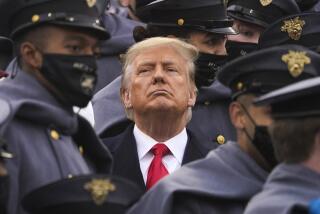Be Careful About Calling In the Cavalry in the Struggle for Homeland Security
- Share via
Last week, President Bush called for reexamination of the 1878 law that limits the role of the military in law enforcement activities. This call was echoed over the weekend by Homeland Security Director Tom Ridge and Gen. Ralph E. Eberhart, head of a new military command that would direct the Pentagon’s response to another terrorist attack at home.
Congressional authority for such a response is already extremely broad, and expansion of that authority would challenge a revered American tradition of keeping the military out of domestic affairs except in the most extraordinary circumstances.
Efforts to further weaken the law--known as the Posse Comitatus Act--are ill-advised and unnecessary.
The Defense Department will undoubtedly play a key role in helping the nation avoid or recover from a terrorist attack. No other government entity has its equipment, training and experience in the use of force. None has such a durable communications system. No other agency, if we include the National Guard, is so widely dispersed across the country in places where its services may be needed.
Recognizing this potential, Congress has passed several laws relaxing the strictures of the Posse Comitatus Act.
One law gives the president authority in an emergency to use the armed forces to perform work “essential for the preservation of life and property.”
Another allows military personnel to assist the Justice Department in collecting intelligence or conducting searches and seizures if “necessary for the immediate protection of human life.”
Still another provides wide-ranging authority to use DOD resources and personnel to respond to an actual or threatened terrorist attack involving a weapon of mass destruction.
Also relevant here are statutes dating back to 1792, when Congress first authorized the president to use the armed forces to put down insurrections.
Military involvement in domestic affairs always has been viewed with great antipathy, and for good reason. Military leaders have long worried that such involvement would erode their readiness to defend the nation abroad.
Civil libertarians worry that while members of the armed forces take an oath to uphold and defend the Constitution, they are not trained, like the police, to uphold Americans’ rights to privacy and due process.
These fears have been heightened since Sept. 11 by the indefinite detention of citizens and immigrants and by proposals to try them before secret military tribunals.
The Declaration of Independence counts among its reasons for severing ties with Britain that the king had “kept among us, in times of peace, standing armies without consent of our legislature ... [and had] affected to render the military independent of and superior to the civil power.”
Creation of a standing army at home may seem farfetched today. But two years ago a national commission on terrorism warned that the president should “always designate a federal civilian agency other than the Department of Defense” as lead federal agency in responding to a terrorist attack.
The commission worried that Americans would not “draw the technical distinction between the Department of Defense--the civilian entity--and the U.S. armed forces--the military entity.”
Unstated, yet palpable, was a fear that the military could, on its own initiative, assume an even broader leadership role in a crisis.
The Pentagon’s own regulations call for it to play a strictly supporting role in a terrorist emergency. Statutes on the books give the Defense Department ample authority to protect the American homeland while performing in that subordinate role.
Proposals to further amend the Posse Comitatus Act should be weighed very carefully because some of our most fundamental liberties hang in the balance.
More to Read
Get the L.A. Times Politics newsletter
Deeply reported insights into legislation, politics and policy from Sacramento, Washington and beyond. In your inbox twice per week.
You may occasionally receive promotional content from the Los Angeles Times.










